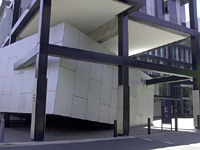Optometry 4B - OPTM4211
Faculty: Faculty of Science
School: School of Optometry and Vision Science
Course Outline: http://www.optom.unsw.edu.au
Campus: Sydney
Career: Undergraduate
Units of Credit: 6
EFTSL: 0.12500 (more info)
Indicative Contact Hours per Week: 6
Enrolment Requirements:
Prerequisites: OPTM4110, OPTM4131, OPTM4151, ; Corequisites: OPTM4231, OPTM4251, OPTM4271
CSS Contribution Charge: 3 (more info)
Tuition Fee: See Tuition Fee Schedule
Further Information: See Class Timetable
View course information for previous years.
Description
Brief Curriculum:
Contact lenses: advanced contact lens fitting, adverse effects of contact lenses, strategies to avoid adverse effects; practical aspects of contact lens patient management, advanced topics and future developments. Binocular vision: amblyopia, comitant and incomitant strabismus, anisekonia, nystagmus. Low vision: aids, survey or current low vision aids, adaptive technology, the multidisciplinary mode of practice.









